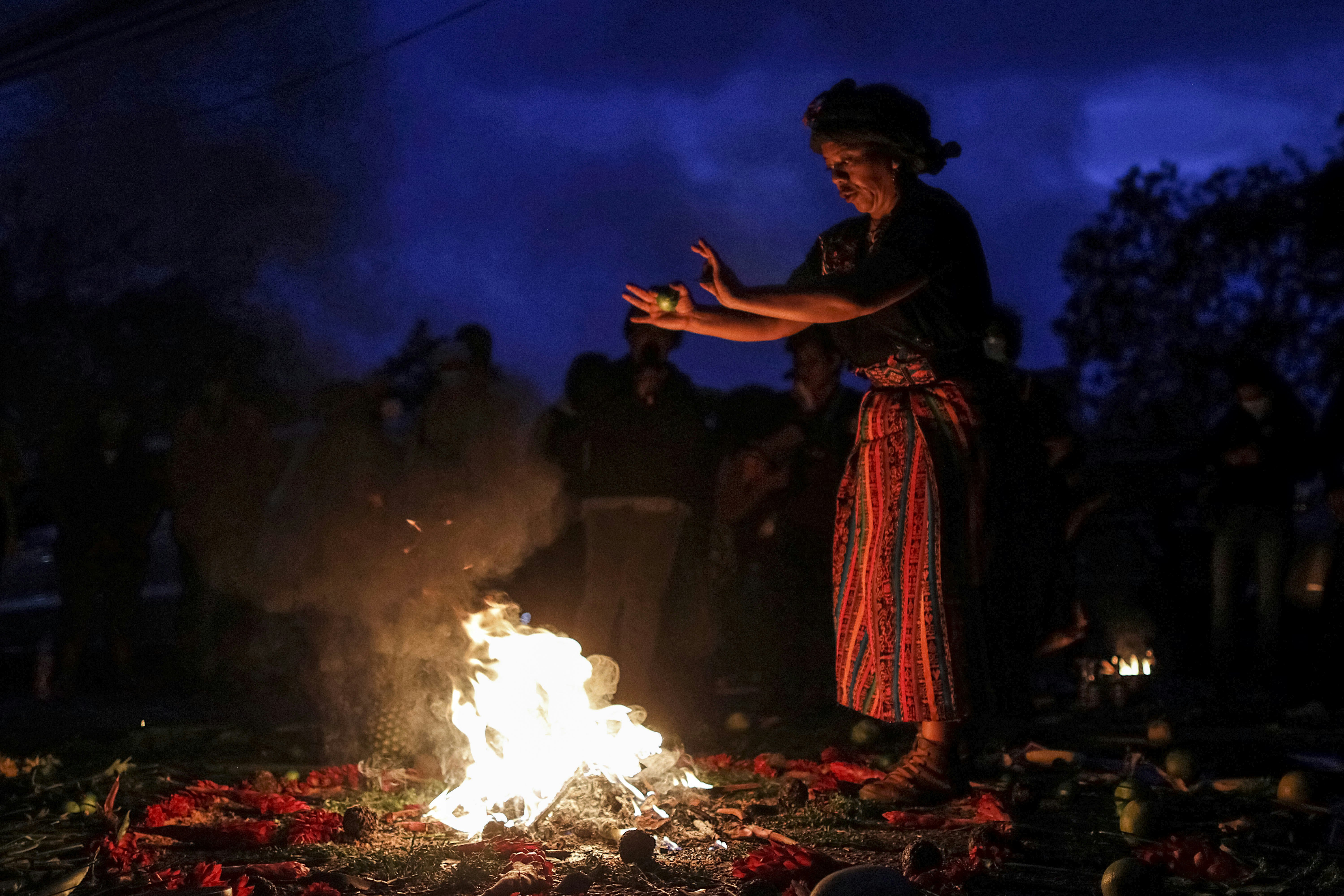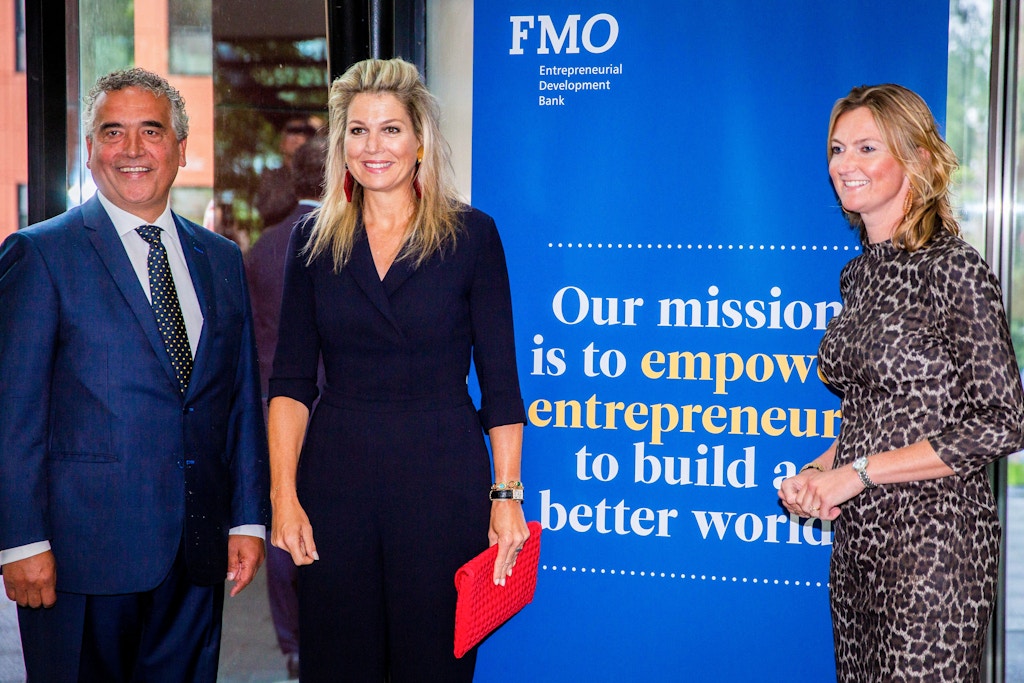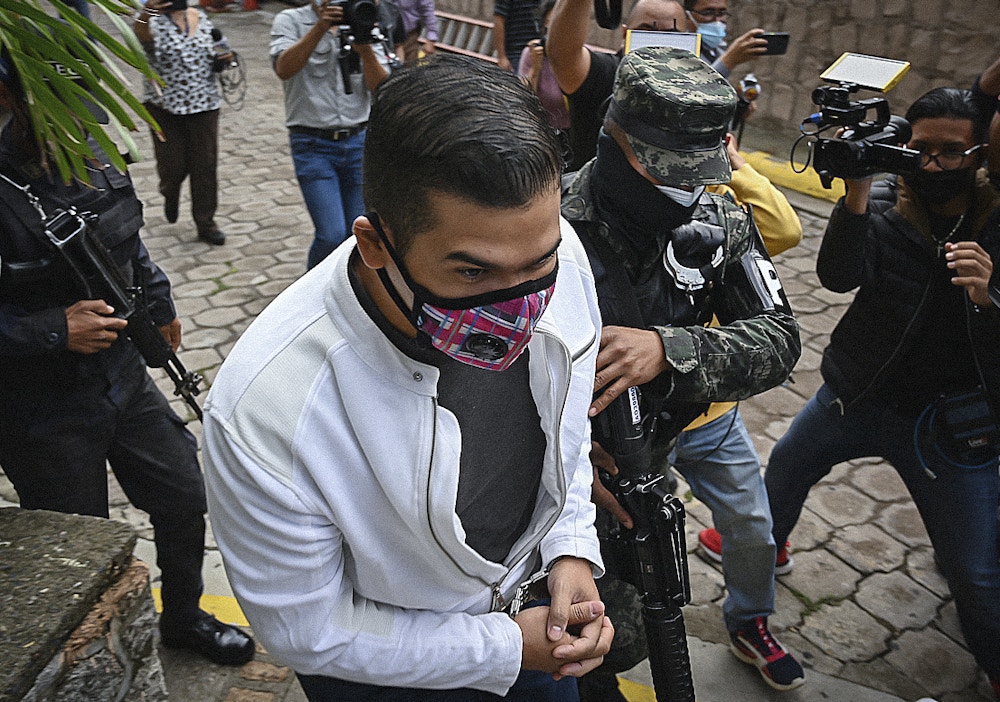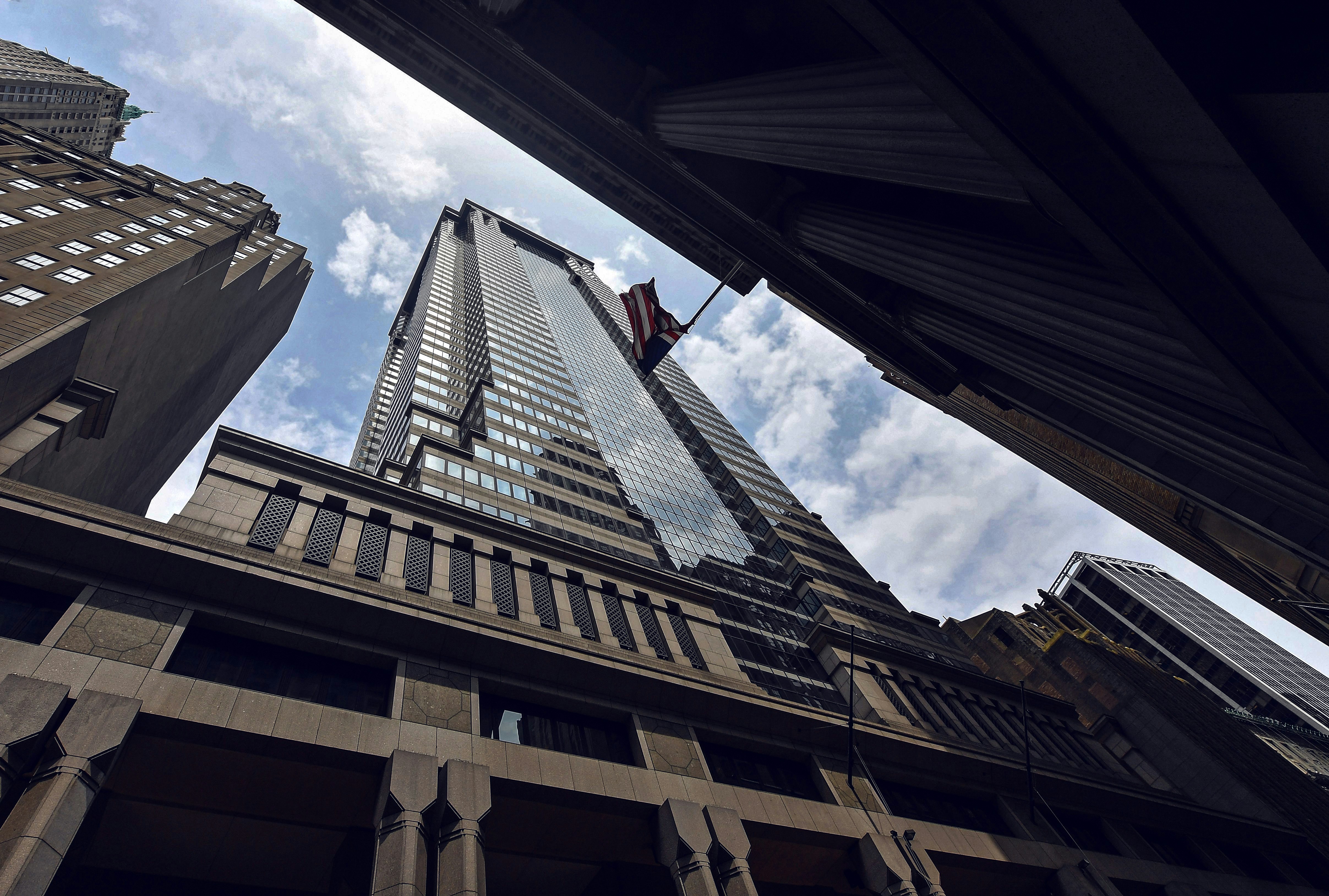Two days before Berta Cáceres was killed in Honduras, a bank in the Netherlands released just over $1.7 million to a concrete company through an offshore account.
Two years earlier, the Dutch-state-owned bank FMO had signed on to finance the controversial Honduran Agua Zarca dam project. Led by a company called Desarrollos Energéticos Sociedad Anónima, or DESA, the dam was the joint effort of David Castillo and Daniel Atala Midence, the company’s respective CEO and CFO. Cáceres, a renowned environmental activist and leader in the Indigenous Lenca community, was the driving force behind the protests against it.
A trove of Dutch and U.S. legal and financial documents shared with The Intercept reveal, for the first time, the flow of international funding in the days leading up to March 2, 2016, when a hit squad broke into Cáceres’s house and killed her. The bank provided the documents to two Dutch human rights lawyers, Wout Albers and Ron Rosenhart Rodriguez, who have spent the past two years representing Cáceres’s family and COPINH, the organization she co-founded, in a civil lawsuit that seeks to hold FMO accountable for its role in the Agua Zarca project. (The suit was first filed in the Netherlands in 2018; Albers and Rosenhart came on in 2020.)
In at least four instances, according to the records, the bank released funding to a company affiliated with Castillo and Atala that did not match the stated payee, routing the money through an offshore account with Deutsche Bank in New York City.
Castillo, who was convicted of being a co-collaborator in Cáceres’s killing in 2021 and sentenced to 22 years and six months in prison on Monday, held leadership positions and financial stakes in several companies beyond DESA. These included PEMSA, a Panamanian shell company with anonymous shareholders, and CONCASA, a concrete company which provides almost no information about its activity in the Honduran corporate registry. His business partner, Atala, is a member of the powerful Atala Zablah family, who preside over a banking and private industry empire almost without parallel in Honduras. No member of the Atala Zablah family has been charged in connection with Cáceres’s killing.
It was Atala who directed the $1.7 million payment to the concrete company Concretos del Caribe S.A., or CONCASA, though another firm was listed as the intended recipient, the documents reveal. Hours after the loan landed, Castillo, in WhatsApp communications released by the Honduran public prosecutor and previously reported on by The Intercept, texted the head of the hit squad that payment was coming, because “the loan [we] requested is available.” It is not known whether Castillo was referring to the loan proceeds sent to CONCASA.
Less than 48 hours later, Berta Cáceres was dead.
“Chats between Castillo and the leader of the hit squad suggest that a few days before [the killing] they didn’t have the funds yet,” Albers, the lead attorney on the case, said to The Intercept. “After the payment, authorized by FMO and carried out by Deutsche Bank as an offshore bank, they did.”
Asked about the bank’s oversight of the payments, FMO spokesperson Monica Beek wrote in a statement: “In view of the legal proceedings that COPINH has started, a response belongs primarily within the framework of a careful judicial process, and not now, selectively and without context.” She referred The Intercept to FMO’s website for further information.
Before Castillo, seven out of the eight men tried for carrying out the hit were convicted of murder in 2018 and later sentenced to 30 to 50 years in prison. But more than six years after Cáceres’s death, family members and human rights workers allege that the killing’s most powerful authors are still at large.
“The practices of these financial institutions … are really surprising to us,” said “Bertita” Zúñiga Cáceres of the revelations. As the current general coordinator of Civic Council of Popular and Indigenous Organizations, or COPINH, she is continuing the work that her mother, Berta, started.
“These transfers weren’t just irregular,” Zúñiga Cáceres told The Intercept. “They were used practically so the owners of DESA could use that money for their own whims — without having any verification measures, without knowing how the transfers were being executed. It’s shocking, knowing that [the money] went to places and to sources that they shouldn’t have been going to, for things that weren’t consensual.”

Photo: Elmer Martinez/AP
In 2015, Cáceres rocketed herself to world fame — and DESA to infamy — when she won the prestigious Goldman Environmental Prize, or the “Green Nobel,” for leading the Indigenous resistance to the Agua Zarca dam construction. As an activist, she helped unite Honduras’s social movements into a common resistance front against the right-wing regimes that took power after Honduran security forces carried out a 2009 coup. The forced transfer of power brought with it a murderous spike in general and state violence, earning public condemnation from the Obama administration — though the State Department never officially classified it as a military coup. The Honduran forces’ deep ties to the United States were well established, and later reporting revealed that then-Secretary of State Hillary Clinton had sought communication with the interim, post-coup government.
In the years since, Honduras has seen scores of assassinations of land and water defenders, many of them Indigenous or Afro-Indigenous, who opposed mining, agro-business, and dam projects which they argued would displace them from their lands. Many of these projects lacked consulta previa, or “prior consultation,” from Indigenous groups, as required under international conventions to which the Honduran government is party. Yet they still received support from transnational financial institutions, such as the World Bank, the Inter-American Development Bank, or — in the case of the Agua Zarca project — FMO in the Netherlands.
FMO prides itself on investing in poor countries plagued by violence and corruption, funneling money into development projects where the “country … lacks financial infrastructure or is perceived as too ‘fragile’ by private investors.” The opportunity to support the Agua Zarca project seemed right up their alley.

Queen Maxima of the Netherlands, center, visits a workshop of the “Fempower Your Growth Program” at the Dutch development bank FMO in The Hague on Sept. 11, 2019.
Photo: Wesley de Wit/AFP via Getty Images
Incorporated shortly before the 2009 coup and contracted for the Agua Zarca project soon after, DESA was jointly owned by Castillo — a business executive and U.S.-trained former Honduran army intelligence officer — and the powerful Atala Zablah family. When FMO agreed to provide the Agua Zarca loan, it said that the money would go to contractors building the dam and not to DESA itself, nor to any transaction with an affiliate, defined as a company that is directly or indirectly controlled by DESA.
In 2013, Indigenous Lenca residents began protesting the dam. They said they hadn’t received consulta previa and alleged the project would displace them from the sacred Gualcarque River. Led by Cáceres and COPINH, protests intensified over the following two years — as did repression. The military killed an anti-dam protester in 2013, and private security contractors later descended on anti-dam blockades.
The violence ultimately led several partners and lenders to withdraw from the project. Sinohydro, a Chinese state-owned company and the largest dam-builder in the world, left in 2013; COPRECA, a Guatemalan construction firm, left in 2014.
But none of that stopped FMO from investing. Around 2011, a number of parties approached the bank about the prospect of supporting Agua Zarca. One was the Central American Bank for Economic Integration, or CABEI, of which José Eduardo Atala Zablah — from the same family invested in Agua Zarca and a former DESA board member — was formerly the Honduran director. Members of the Atala Zablah family did not respond to The Intercept’s attempts to reach them for comment.
On February 27, 2014, FMO, with participation from a Finnish development financier, Finnfund, agreed to loan $20,000,000 to finance the Agua Zarca project. Under the same agreement, another $24,400,000 would come from CABEI, which was listed as the administrative agent.
The debt to those banks would constitute 70 percent of the project’s estimated $63.4 million budget. The other 30 percent would be financed through equity, comprising shares owned by Inversiones las Jacarandas, an investment company owned by six members of the Atala Zablah family, as well as Potencia y Energía de Mesoamérica S.A., a Panamanian shell company run by Castillo. PEMSA has 100 percent bearer shares, meaning its shareholders can’t be verified based on public records.
As a part of the loan agreement, FMO and CABEI agreed to have their money transferred to DESA through a third-party offshore account with Deutsche Bank, listed in the agreement as the “Offshore Security Agent,” in New York City.
“Marina [Pannekeet, an FMO employee] wanted me to have a reserve account,” David Castillo later wrote to Daniel Atala in WhatsApp conversations extracted by Honduras’s public prosecutor.
“She doesn’t want us to ever see the money,” Atala replied.
In 2016, FMO energy director Elvira Eurlings told Dutch journalists that the bank warmed to the idea of financing DESA in part because of its connections to the people behind it. “We knew the two families behind the DESA project as good businessmen with a good reputation,” Eurlings said. “They were not on any blacklist — there was no corruption or criminal activity.” Reached for comment, FMO did not address The Intercept’s request to clarify who the two families were.

Photo: Jahi Chikwendiu/The Washington Post via Getty Images
Cáceres was murdered almost two years to the date after FMO signed the loan. Amid a wave of media scrutiny, the bank withdrew from the project. But FMO didn’t stop defending its support for the dam — until Castillo’s guilty verdict last year.
“FMO financed a company whose CEO has now been found guilty of being involved in murder,” read a statement published on the bank’s website. “We are devastated by this. In hindsight, we wish we would never have invested in the Agua Zarca project.”
But FMO, Albers and Rosenhart argue, should have known something was amiss. The documents they shared with The Intercept illustrate that FMO’s internal records with the Deutsche Bank offshore account — to which both banks had direct and repeated access, and which in some cases were signed by an FMO representative — show the Honduran loan beneficiaries repeatedly listing one payee for the wire transfers, then directing the transfers to another. Under this process, FMO ended up sending millions of dollars to CONCASA.
For the first of these payments — on a document titled “Construction Requisition No. 1” and dated November 12, 2014 — Castillo requested the wiring of over $1.4 million to COPRECA, the Guatemalan-based construction company that would go on to leave the Agua Zarca project at the end of that year. The payment appears to have landed with COPRECA as intended.
After a few more transactions, Daniel Atala signed off on a document titled “Construction Requisition No. 5” and dated June 9, 2015, in which he requested over $3.6 million for COPRECA. By that time, COPRECA had left the Agua Zarca project. On the same page, the payment instructions direct the money to a separate company: “Concretos del Caribe SA,” or CONCASA. (In January 2016, Castillo gave Daniel Atala administrative control over CONCASA.)
FMO declined to elaborate on these transactions.

Albers and Rosenhart say that failure to report transactions that may seem suspicious carries potential legal implications. In the Netherlands, for one, the Wwft law (which is the Dutch acronym for, roughly, “Anti-Money Laundering and Anti-Terrorist Financing Act”) requires any bank, lawyer, or investment institution to report “unusual transactions” to the country’s Financial Intelligence Unit. Failure to do so constitutes a potential “economic crime” under Dutch law.
The payments carried on. In a September 14, 2015, document titled “Construction Requisition No. 6” Castillo requested nearly $1 million for COPRECA, while listing the account beneficiary name as CONCASA.
G.W. de Boer, a manager at FMO Bank, personally signed off on this document, as did Castillo. (Later, on page 446 of its 676-page Dutch language response, FMO contradicted this by saying, “All parties to which money was provided were known to FMO.” The reply lists COPRECA as a loan recipient but does not mention CONCASA.)
The payments to CONCASA continued that November. On a document titled “Construction Requisition No. 7,” dated November 24, Castillo requested over $2.6 million for COPRECA, again sending it to CONCASA.
By this point, in late 2015, Castillo was already collaborating in the murder plot. Castillo, along with DESA’s former security chief Douglas Bustillo, had organized a hit squad in which Honduran army intelligence chief Mariano Díaz led a former Special Forces sniper, who was once under Díaz’s command, alongside three sicarios, or hired assassins. They failed to kill her on February 5, 2016, after one of the sicarios reported seeing too many people near the house.
“Mission aborted,” Bustillo wrote to Castillo afterward, in phone extracts obtained by the Honduran public prosecutor. “I’ll wait for what you promised, because I don’t have logistics [money] anymore. I’m at zero.”
But the logistics would come soon. The mission was less than a month away from success.

Members of the Military Police escort David Castillo — president of Desarrollos Energeticos S.A, or DESA — to court to listen to his sentencing for murder of Honduran environmentalist and Indigenous leader Berta Cáceres, in Tegucigalpa, Honduras, on July 5, 2021.
Photo: Orlando Sierra/AFP via Getty Images
On a final document titled “Construction Requisition No. 9,” dated February 23, 2016, Daniel Atala requested the withdrawal of over $1.7 million. Once again, the request listed the recipient of the money as COPRECA while on the same page directing it to CONCASA. The document bore the signature of G.W. de Boer, the FMO manager.
According to phone extracts obtained by the public prosecutor, at around 1 a.m. on March 1, Castillo texted Bustillo that he could give him the money later that morning because “tonight they pay me and I can have the requested loan available.”
On March 2, Bustillo’s assassin squad left the coastal city of La Ceiba. They arrived in Cáceres’s hometown, La Esperanza, in the evening. Just before midnight, they burst into her home and murdered her.

As reporters began investigating the case, the screws were soon turned on DESA. Out of four suspects arrested in May 2016 in relation to the killing, one was a DESA employee. FMO stuck to its narrative: Though Berta’s killing was a tragedy, the bank’s financing of Agua Zarca was still a net benefit for the community.
In July 2017, in response to tensions over the project, FMO and Finnfund announced they would officially end their involvement with Agua Zarca. They forgave the loan on their way out, essentially gifting the dam effort with over $6.1 million dollars. According to page 546 of the Dutch-language reply, “FMO and FinnFund had to give up the repayments on their loans and the interest on those loans in order to reach an Exit.”
They forgave the loan on their way out, essentially gifting the dam effort with over $6.1 million dollars.
Funds from CONCASA had provided other support for the project: While police guarded the construction site, transfers taken from the concrete company were written out for furniture to keep the police presence comfortable. As reflected in documents released by the Honduran public prosecutor, money from CONCASA paid the salary of Sergio Rodríguez, a former DESA manager convicted of orchestrating Cáceres’s murder, while he was detained awaiting trial.
On February 29, 2016 — six days after the $1.7 million loan request and two days before the killing — Daniel Atala ordered $1.2 million to be transferred from CONCASA’s bank account with BAC Credomatic in Honduras to PEMSA, run by Castillo, in Panama. The day after the killing, PEMSA’s bearer share option, which allowed the shareholders to remain anonymous, was listed as having been terminated in the Panamanian corporate registry.
For Albers and Rosenhart, the rapid succession of these events — payment, killing, and change in ownership structure — was suspicious.
Speaking to The Intercept, Rosenhart argued that the documents raise substantial questions about whether some of the loan money actually went toward the dam project, and that they revealed “severe negligence from the banks to monitor how their loan was spent on the other. They also demonstrate that there are still several lines of financial investigation open for the Honduran, Panamanian, Dutch, and even US authorities to research.”

Photo: Angela Weiss/AFP via Getty Images
As it flowed from the Netherlands into Central America, FMO’s money made repeated stops at an offshore account based out of New York City. While Albers and Rosenhart focus on FMO, two U.S.-based lawyers raised questions about whether the Deutsche Bank in New York stands in potential violation of the law as well.
Deutsche Bank did not answer repeated calls from The Intercept seeking comment.
The multinational bank has a history of questionable financial practices. In April 2022, its German offices were raided by the country’s authorities over suspicious activity reports. Over a year earlier, it was forced to pay $43 million to the U.S. Securities and Exchange Commission after having “failed to implement a system of internal accounting controls,” while leaked documents from 2020 showed that the bank helped launder hundreds of billions of dollars of embezzled money as well as funds connected to organized crime over the past decade.
Deutsche Bank’s failure to report the CONCASA transfers comes as little surprise to Kelsey Jost-Creegan, a Harvard-trained lawyer who works with land defenders in Central America as a part of the legal organization EarthRights International.
Jost-Creegan reviewed the wire transfers to CONCASA and suggested examining them under the Bank Secrecy Act and related regulations, which require U.S. banks and financial institutions to develop and implement anti-money laundering controls.
“The fact that these transactions passed through Deutsche Bank New York means that both U.S. federal and New York State anti-money laundering (AML) laws are implicated,” Jost-Creegan said, arguing the loan transfers were riddled with red flags that should have heightened AML due diligence. In 2015, she pointed out, the U.S. State Department listed Honduras as a “jurisdiction of concern” for money laundering and financial crimes.
“The amount of the transfers surpassed AML thresholds,” she told The Intercept. Like Albers and Rosenhart, Jost-Creegan highlighted the discrepancies between stated payee and beneficiary.
Sarah “Poppy” Alexander, a California-based lawyer who represents financial whistleblowers, was briefed on the transactions and argues that institutions like Deutsche Bank are responsible under U.S. law to report suspicious transactions in suspicious activity reports. “To the extent Deutsche Bank had any reason to fear the transfers were being used for any suspicious purpose, they would normally have to disclose that,” she said. “To the extent the money was moving to a different account, or that was not connected to the dam, that should generally raise questions.”
“If FMO manages to overcome its existential crisis as a development bank, it should re-examine the unethical modus operandi of facilitating foreign multi-millionaires for development, in the hope that some of their money ends up where it can be used for a good cause,” Rosenhart said. “Which, in the case of Agua Zarca, was an illusion from the start.”
The forces behind Agua Zarca belong to a broad network that encompasses some of the wealthiest people in Honduras — including two powerful families whose members have never faced charges in connection to the Cáceres killing.
The forces behind Agua Zarca belong to a broad network that encompasses some of the wealthiest people in Honduras.
Several members of the Atala Zablah family are direct blood relatives of the separate, but similarly powerful Atala Faraj family. Six Atala Zablah siblings — all of whom were shareholders in “Inversiones las Jacarandas,” itself the majority shareholder of DESA — are first cousins of the billionaire Camilo Atala Faraj. Three of those siblings, as well as one of their sons, were board members or held positions at DESA: Pedro Atala Zablah, owner of CAMOSA, Honduras’s John Deere distributor, and co-president of Motagua Football Club; Jacobo Atala Zablah, president of BAC Credomatic Honduras bank; José Eduardo Atala Zablah, formerly the Honduran director of CABEI and current co-president of Motagua Football Club. José Eduardo’s son is Daniel Atala Midence, who was the CFO of DESA and had administrative control over CONCASA after January 2016, when it received the final payments of FMO money.
José Eduardo Atala Zablah, Pedro Atala Zablah, and Daniel Atala Midence were all part of a corporate WhatsApp group with David Castillo titled “Seguridad PHAZ” that discussed DESA security, media strategy, and the group’s relationship with Cáceres in the days surrounding her murder.
For years, U.S.-based lawyers working on behalf of the Atala Faraj family have demanded corrections from journalists investigating Cáceres’s assassination, saying that the two families are separate and that the Atala Faraj family had nothing to do with the dam. Camilo Atala Faraj, the owner of FICOHSA bank, is one of the wealthiest men in Honduras. David Castillo, Daniel Atala Midence, and DESA board members have referred to FICOHSA loans in WhatsApp conversations presented by Honduras’s public prosecutor, though FICOHSA has repeatedly denied being involved in the DESA project.
COPINH and Cáceres’s family insist that Castillo is merely the co-author of Cáceres’s assassination. Faltan los Atala, they say of the killing: “The Atalas are missing.” Both the Atala Zablah and the Atala Faraj branches of the family have fiercely and consistently denied this accusation. The Intercept attempted repeatedly to reach the Atala families for comment.
“No one has been investigated for the [financial] irregularities,” said Zúñiga Cáceres. “The search for justice for my mother, our compañera Berta Cáceres, is an opportunity for Honduras to show the nefarious role of these banking entities who speak of a false vision of development, but at the end of the day, are only interested in their pockets, at the expense of the population.”
On May 25, Honduras’s National Congress decreed that Berta Cáceres would be elevated to the status of a national hero. It struck some as strange that she would be placed on a symbolic pedestal, because the systemic problems that led to her death — the violence, corruption, impunity, and extractive projects — remain pervasive. Environmental defenders, after all, continue to be murdered at alarming rates in Honduras. And the full extent of the network that was involved in planning her assassination remains unknown. Some complicit in her killing may still be beyond the reach of justice.
This content originally appeared on The Intercept and was authored by Jared Olson.
Jared Olson | Radio Free (2022-06-23T09:00:48+00:00) Newly Released Documents Reveal International Funding Trail Preceding the Murder of Berta Cáceres. Retrieved from https://www.radiofree.org/2022/06/23/newly-released-documents-reveal-international-funding-trail-preceding-the-murder-of-berta-caceres/
Please log in to upload a file.
There are no updates yet.
Click the Upload button above to add an update.
